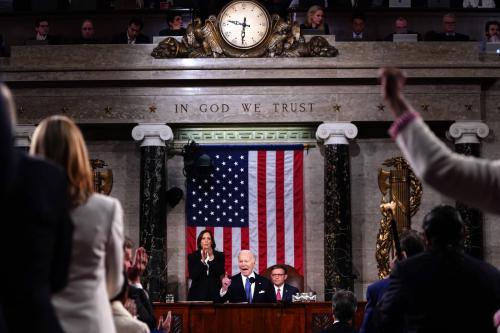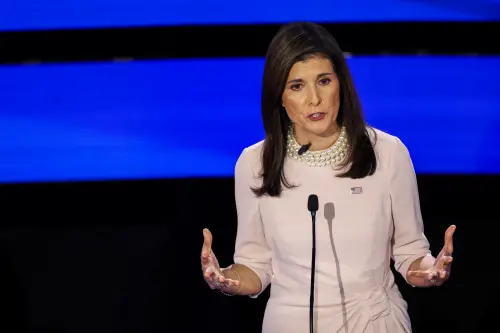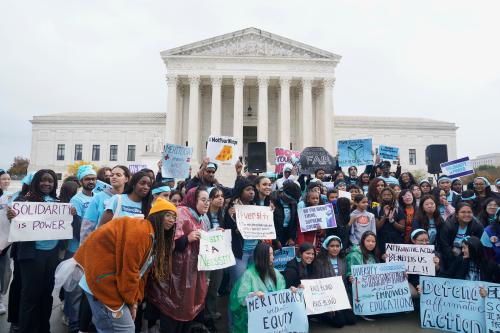To best serve the president and the nation, experts agree, the National Security Council staff needs to be strong, small, subdued, selective in its issue engagement, and focused above all on management of the policy process. The new administration has declared fealty to this widely-shared consensus, and President Bush’s national security adviser, Condoleezza Rice, has taken important steps to make it reality.
Yet the pattern of the new NSC’s first month suggests a danger, even a likelihood, that day-to-day pressures will pull her, like too many of her predecessors, into a highly operational and visible role. Unless she fights actively against these pressures, she will find her NSC unable to do what only it can do?harness Bush’s strong-willed senior officials in an effective system for making and implementing decisions on first-order foreign policy issues.
Rice has certainly brought welcome changes to the NSC staff:
It has been cut by 30 percent, to about 70 policy professionals (though this is still larger than any NSC staff prior to 1996).
The structure has been simplified. Three formerly-separate regional offices have been combined in a European and Eurasian affairs directorate. Offices dealing with health, the environment, refugees, and other humanitarian issues have been consolidated in a single directorate for democracy, human rights, and international operations.
Support offices have been sharply curtailed. Both legislative affairs and communications are now handled by the White House proper, while a small NSC press and speechwriting office works in tandem with much larger White House operations.
A second NSC deputy post, responsible for international economic issues, has been created. In a welcome effort to integrate security and foreign economic policy, the deputy will report both to the national security and the national economic adviser.
But if the structural changes clearly point in a positive direction, how Rice is playing her personal role sends a quite different signal. She has been far more operational and visible than one would have expected from her earlier emphasis on the NSC’s inside role of “working the seams, stitching the connections together tightly…provid[ing] glue for many, many agencies and instruments the United States is now deploying around the world.”
Instead of leaving diplomacy to Secretary Powell and the State Department, Rice has met with almost every foreign visitor coming to town?including the foreign ministers of Britain, Canada, Colombia, Japan, Jordan, and Mexico, and senior representatives of the European Union and the incoming Israeli government. There may be times when such meetings are appropriat?to communicate priority presidential interests, for example?but they should not be the norm.
Nor has the national security adviser shunned the public limelight. Rice has appeared on the Sunday morning TV talk circuit (CNN Late Edition), been interviewed live on the NBC Today Show, and granted interviews with the Washington Post and New York Times. For the latter, she announced a major change on U.S. policy toward the Middle East (echoed by Powell in his own press conference the same day) and apparently broke the news of the administration’s three military policy reviews. Rice has also conducted on-the-record briefings prior to and following the president’s visit with foreign leaders.
Part of the reason for these meetings, appearances, and statements may be simple inertia. For some time, foreign governments have looked to the White House, rather than the State Department, as the real locus of power, and the NSC staff (much of it held over from Clinton) has routinely steered foreigners to meet with senior NSC officials. Part of it may also be deliberate?an effort to get to know foreign counterparts and to sell a new policy message, notably on missile defenses.
But such activities have serious costs?notably in time not spent doing other, more important things. While secretaries of state can meet with foreign dignitaries, and many others can make an administration’s public case, there are some things only the NSC can do. Above all, the president needs the NSC to manage the foreign policy process, making sure everyone with a stake in the issue has a voice, that all reasonable policy options are presented to the president for his consideration, and that decisions are made in a timely manner and then effectively implemented. Moreover, a heavy public and operational role risks turning the national security adviser into a rival of the secretary of state, undercutting the trust essential for this process management role.
It is not too late to set things right. But the path of least resistance is the operational, public path that the national security adviser seems to be sliding into. If this continues, the President?and the nation?will not be well served.



Commentary
Op-edHow Operational and Visible an NSC?
February 23, 2001